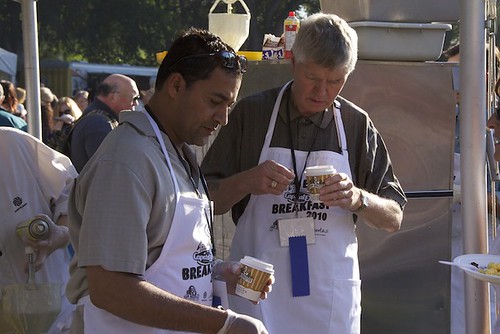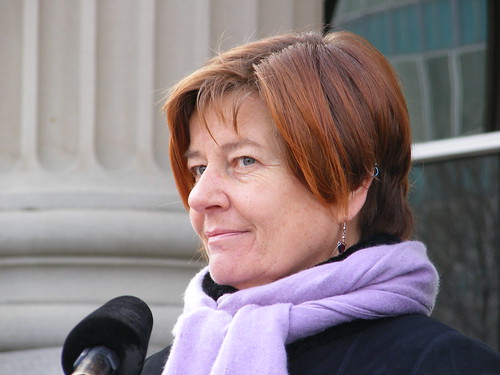Alberta’s municipal election is only 14 days away.
When you think of municipal elections, you might immediately think about roads, libraries, sidewalks, pools, traffic, playgrounds, potholes, public transit, bike lanes and snow removal. And while these are some of the more high-profile responsibilities of municipal governments, the amount of information being thrown at voters in this year’s election has muddied the water about what the ballot issues on October 18 might be.
Electing Mayors, Councillors and School Trustees
The primary function of municipal elections is for voters to elect their local municipal officials in their city, county, municipal district, town, or village. Voters also cast ballots for trustees to govern their Public, Catholic or Francophone school boards. (Here is a list of candidates running in Edmonton’s municipal election).
This year there are open mayoral races with no incumbent running for re-election in the cities of Calgary, Edmonton, Grande Prairie, Lethbridge, Red Deer and the Regional Municipality of Wood Buffalo, which will mark a big turnover in municipal leadership in Alberta.
As if there weren’t already are a lot of challenges facing municipalities, the COVID-19 pandemic has hit Alberta hard and municipal governments are bearing the brunt of many of those health, social and economic challenges.
Municipalities also face a hostile provincial government that has not hesitated to interfere in local issues, in some cases leaving Albertans with a choice between candidates who agree with the provincial government interference, candidates who want to keep their heads down in hopes for a change of provincial government in 2023, or candidates who will stand up for their communities and challenge the United Conservative Party government.
Senate Nominee Election
When you vote on Oct. 18 or in the advance polls you will probably be handed a few different ballots. One of them will ask you to choose up to three candidates in this year’s Senate Nominee Election.
Senate Nominee elections are a uniquely Alberta activity dating back to 1989. The elections are held to choose a list of names for the Premier to recommend to the Prime Minister for appointment to the Senate if vacancies occur.
There is currently one vacancy in Alberta’s 6-member Senate delegation and another vacancy is expected when Senator Doug Black retires on October 31, 2021.
Unfortunately for the candidates running in this election, they are not going to be appointed unless the Prime Minister is a member of the Conservative Party, the only major party that recognizes the elections as legitimate. The Liberal Party has created a new application process for Senate appointments, dismantling the old partisan patronage machine, and the NDP believe the Upper Chamber should be abolished.
One of the major flaws of the Senate Nominee election is that winning candidates who might eventually be appointed to the Senate never ever have to face re-election, so there is no opportunity for voters to hold these “elected” Senators accountable for their decisions. In fact, they can stay in the Senate until they turn 75-years old if they decide to.
Another major flaw is that a province-wide election in a province of 4.3 million people makes it impossible for the Senate candidates to meaningfully reach many voters. I doubt most Albertans could name a candidate running in year’s Senate Nominee election, but here they are:
Progress Alberta executive director Duncan Kinney is running on the “Fuck Kenney Vote Kinney” slogan and Chad Jett Thunders Saunders is running to turn the Senate into a “Thunderdome.”
Physicians Dr. Sunil Sookram. and Dr. Karina Pillay (also the former Mayor of Slave Lake), Ponoka Mayor Rick Bonnett, former Western Barley Growers Association President Jeff Nielsen, and former deputy premier and finance minister Doug Horner are running as Independent candidates are are the more serious candidates with real public service experience.
Then there are the three People’s Party endorsed candidates who filed their papers to run in the Senate Nominee election only hours before they were defeated as candidates in the Sept. 20 federal election – Nadine Wellwood, Kelly Lorencz, and Ann McCormack.
And finally there are the three UCP loyalists endorsed by the Conservative Party of Canada – lobbyist and former UCP President Erika Barootes, right-wing activist and failed municipal candidate Pam Davidson, and Ukrainian-Canadian trade association president Mikhailio Martyniouk.
The three UCP/Conservative Party candidates, who appear to have less comparable actual public service experience than many of the Independent candidates on the ballot, are still probably going to win. But like previous Senate Nominee elections, the turnout will be low and number of spoiled ballots will be high.
Alberta’s Senate Nominee election should be a serious affair, but it will probably end up being a joke or an afterthought for most Albertans who will have no idea who to vote for.
Plebiscites and Referendums
Depending where you live in Alberta you could also be handed one, two or three additional ballots to cast your vote for referendums and plebiscites, though there is a good chance you haven’t heard much about them during this election.
There are two province-wide referendums.
The first is Premier Jason Kenney’s referendum to remove the Equalization program from the Constitution. The results won’t actually remove Equalization from the Constitution, but Kenney has said it would put Alberta in a strong bargaining position to negotiate with the rest of Canada. This is unlikely.
Even if the Equalization formula was removed from the Constitution, Albertans wouldn’t actually notice any change. We would still pay federal taxes the same as we do now, but the federal government would not be obligated to distribute funds collected through federal taxes to the provinces through an Equalization formula as currently required by the Constitution.
The Equalization referendum is all about the politics of grievance and saving Jason Kenney’s leadership of the UCP. A yes vote won’t accomplish much and a no vote will probably hurt Kenney’s chance of remaining in the Premier’s Office for much longer (Kenney’s approval rating has dropped to 22 per cent according to a recent poll from ThinkHQ).
The other province-wide referendum will ask Albertans whether they want to permanently remain on Daylight Saving Time rather than having to switch between DST and Mountain Standard Time twice each year. While the annual time-change is widely unpopular, it is unclear why the UCP cabinet chose to ask Albertans if they want to make DST permanent rather being able to choose between DST and MST.
In this referendum, a no vote is a vote to continue the annual time change and a yes vote is a vote for darker mornings and lighter evenings in the winter. If I understand correctly, it could also mean that from March to November each year Alberta’s timezone will be two hours ahead of the times observed in much of British Columbia. The result of the vote on this question is binding on the provincial government.
And if you live in Calgary, you have a chance to vote to rejoin the 21st century and put fluoride back into your public water. Good luck with that, Calgary.
Endorsements
At least in Edmonton, candidate endorsements have become a mini-story.
This year’s city council election has seen a string of high-profile endorsements of city council candidates from Mayor Don Iveson, mayoral candidate Mike Nickel and some individual NDP MLAs across the city. While it is not unheard of for incumbent City Councillors to endorse candidates in a municipal election, the number of endorsements in this year’s election is significantly higher than usual.

Just like City Councillor endorsements, it is not unheard of for MLAs to endorse candidates, but this year the number of MLAs endorsing municipal candidates is higher.
The decision by some NDP MLAs to endorse candidates has flustered some political watchers who for some reason believe municipal politics should exist in a vacuum outside of provincial and federal politics, the endorsements appear to be a choice made by individual MLAs rather than a decision made by the party.
And in at least one case, NDP MLAs have endorsed different candidates. In Ward tastawiyiniwak, for example, the NDP endorsements appear to be split, with Edmonton-City Centre MLA David Shepherd endorsing Ahmed Knowmadic Ali and Edmonton-Beverly-Clareview NDP MLA Deron Bilous endorsing Cody Bondarchuk.

While there was an attempt a year ago to create a single-slate of progressive candidates in Edmonton’s city council election in response to expectations that the UCP would organize a slate, the organizing effort appears to have failed because there were too many progressive candidates wanting to run for city council to make a single-slate feasible.
While it has certainly made Edmonton’s political establishment uncomfortable, it is positive to see progressive groups organizing to support candidates. With traditional low turnout, low interest and high-incumbent re-election, municipal politics in Edmonton could use a bit of disruption.
Election Finance law changes are the real story
Changes to Alberta’s municipal election finance laws introduced by UCP cabinet Ministers Kaycee Madu and Doug Schweitzer in June 2020 allow for much less transparency and accountability showing who is spending money to influence candidates and votes.
The new rules make it legal for wealthy people to donate up to $5,000 each to as many candidates as they want in any municipal or school board election across the province, effectively removing the cap on individual donations. While municipal political donors do not receive the generous tax credits they get from provincial or federal donations, there are wealthy Albertans with the ability to financially influence candidates across the board.
The UCP also removed the requirement for candidates to disclose their list of donors ahead of Election Day, which would have allowed voters to see who is financially supporting candidates before they go to the ballot booth. Many candidates will already do this on their own but many won’t because they are not required to by law.
The new rules introduced by the UCP also allow Third Party Advertisers, colloquially known as political action committees, to spend up to $500,000 on advertising during the referendums, up from the previous $150,000 limit. Third Party Advertisers that spend less than $350,000 on advertising during a referendum are not required to file financial statements with Elections Alberta, which means those groups don’t have to publicly disclose their donor lists.
There are currently four registered Third Party Advertisers registered with Elections Alberta that are advertising during the Referendum. Alberta Proud (who’s contact person is former Wildrose Party press secretary Vitor Marciano), Equalization Fairness Alberta (run by former UCP ministerial chief of staff Dr. Bill Bewick), Society of Albertans Against Equalization (run by Canadian Taxpayers Federation director Franco Terrazzano), and Vote Yes To End Equalization Inc.
One Third Party Advertiser registered to participate in Calgary’s municipal election is being investigated by Elections Alberta for allegedly sending out campaign signs for Calgary mayoral candidate Jeff Davison.
And that is a quick guide to the dog’s breakfast that is Alberta’s 2021 municipal elections. Make sure to vote on Oct. 18 or in the advance polls starting today.
Good luck, Alberta.



















